| 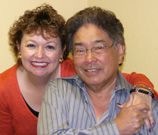 Effective
Teaching...
Effective
Teaching...
by Harry and Rosemary
Wong
November
2007
The Floating
Teacher
This month’s column won’t reveal the
secrets of a master illusionist. It’s not a recipe
for a heavenly baked meringue dessert. It’s about
teachers without a classroom who roam the corridors in search
of a nesting place. If you do not have your own classroom,
you know who you are. You pass each other in the hall as
you roll your carts. You’re called floating
teachers, migrant teachers, nomadic teachers, and jokingly, some
of you call yourselves, “homeless teachers.”
Floating teachers are typically found in junior and senior high
schools, where the school schedule is divided into periods and
teachers have specific subjects to teach.
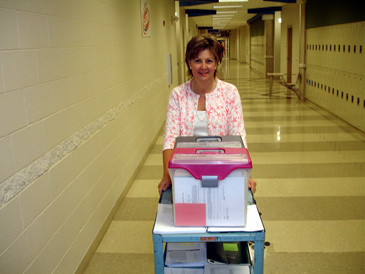
Such a teacher is Diane Blocker, who teaches
at Huntsville High School in Alabama. With a positive outlook
and putting her students first, she has developed some unique
procedures that help her manage her floating status. Her
experience has inspired this month’s column.
Being a floating teacher can be a positive experience.
- You get to see the school and meet some wonderful teachers
who share their rooms with you.
- You get to see the various activities that go on in the school,
and get a feel for what the students are doing outside of your
classroom.
- You get to meet many of the students who are not even in your
class.
Advice to Teachers
The advice to any new or veteran teacher is simple:
preparation, preparation, preparation. (See page 94,
The First Days of School.)
You prepare with procedures.
It is very important that you have procedures to the
hilt! As a floating teacher, you need consistency
and stability in your classroom and your life.
To be an effective floating teacher, be organized—very
organized. Teachers in their own classroom have everything
at hand. The administration, the parents, and the students
will expect the same from the floating teacher.
The Facts of Floating
- You probably will not be able to arrange the desks
as you would like, so scope out each room and prepare
seating charts and seating procedures for when the students
first enter the classroom.
- You will not be able to post a bellwork assignment
beforehand, so appoint three assistants who will post
the assignments for you. If you are wondering why three
assistants, it’s better than one because if your student
assistant is absent, the chances are one of the two remaining
assistants will be in class. Back up is good. Two
back ups are even better! It’s best to rotate groups
of students as monitors or assistants as well so everyone feels
responsible for the smooth operation of the classroom.
Bellwork assignments can be on transparencies in a binder
that you have been left in the room. If the classroom
does not have a transparency projector, start looking for
alternatives such as a digital projector, a flip chart, a
chalk board, an interactive white board or slips of papers
the assistants can distribute at the door. The best
bellwork has a consistent format that does not have to be
announced until it is changed every few weeks or so.
This is commonly done in primary grades where students come
in and get a book to read.
Just because you are a floating teacher does not let you
off the hook from being an effective teacher. All
effective classrooms have three things posted when the students
begin class: 1) the time schedule, 2) the bellwork assignment,
and 3) the lesson objective. Display these
as soon as possible. The students want to come and learn.
With the three items posted daily, the culture of the classroom
has been set—this is a classroom for learning—everyday.
The students will know what is expected of them and what they
are to learn.
- You won’t be able greet the students at the
door, so plan a genuine greeting after the class starts
working on their bellwork. A wonderful smile, a kind compliment,
a set of inviting, caring words will go far to start the class
on a positive tone.
Pointers to Help You Succeed
As a floating teacher you are not alone in the world.
In many countries it is the teacher who moves from room to room.
The teacher, not the students, is in transition. If you
are one of the chosen teachers who does not have a personal room
and must float from room to room, these pointers will help you
succeed and enjoy teaching as a floating teacher.
Cart: This is most important; you need
a cart with good wheels. You also need a safe place to store
your cart. The cart must be sturdy and stable, not prone
to tip over. It must be sized to easily navigate the halls
and your classrooms. The cart is your lifeline to all your
materials, handouts, and files you will need.
Choosing the right cart for your needs is equally as important.
Some teachers may only need storage, whereas others might need
a cart that holds materials needed for teaching and for student
activities.
If you only need to carry a minimal amount of supplies with
you, try using a multi- compartment shoulder bag or wheeled
case or tub.
Storage bins: These are plastic file bins
with hinged lids which are made to hold the Pendaflex®-style
hanging file folders. You’ll need one or more bins.
Organize loose items, especially smaller ones, in small baskets,
bags, or caddies. Store the containers on your cart’s
shelves. Make use of color-coded, different sized, zip type
bags. They keep art supplies, math instruments and manipulatives,
science equipment, and other school supplies grouped and readily
available.
Folders and files: Get a set of the hanging
file folders that expand to two or three inches. You can
place manila files into the expansion folders. The tabs
on the manila files are much easier to label and re-label than
to try and label the hanging folders. To re-label, you will
need a supply of file labels.
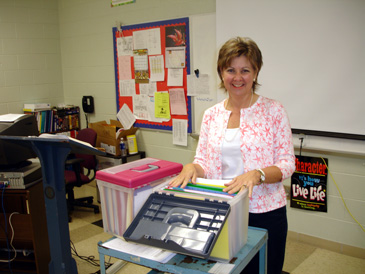
Prepare “in” and “out” files. The “in”
file is for student work to be checked, recorded, or graded.
If you have to grab one folder rapidly at the end of an exhausting
day, grab the “in” file because that’s the one
you need to take home to check and score.
The “out” file contains work that has been checked,
recorded, or graded and is to be returned to the students.
Prepare other files for handouts, forms, and other needed papers.
Tobias Larson, a teacher at Notre Dame High School in Belmont,
California, says, “I was a floating teacher last year
and one of the major things that made me successful was a traveling
file folder. It is a plastic 6” x 13” x 10”
box that holds file folders just like a file cabinet that would
travel all day with me. In this I had an ‘in’
folder and an ‘out’ folder for every period.
“I also kept a folder for handouts for each course I
taught and I had one folder for miscellaneous forms or letters
that the students would hand to me. This prevented any
lost papers as they were all kept safe in the box through the
day.
“I also became a master with PowerPoint and made my daily
warm-up exercises in PowerPoint. I did this to utilize
the technology available in the rooms that I taught in.
Since each room had a computer projector, it was an easy way
to ensure that the first five minutes of each class was ready
to go regardless of the time it took me to reach each classroom.”
Toolbox: Have a personal toolbox with
compartments where you can keep small items, like clips, rubber
bands, glue, tape, and tacks. The larger compartment will
hold a screw driver, pliers, hammer, stapler, scissors, duct tape,
super glue, utility knife, wire cutters, flashlight, and other
needed tools. Keep cleaning materials in here too, like
spray cleaner, rag, and tissue. Don’t forget some
Band-Aids®, chalk or white board markers, and that bottle
of headache reliever for yourself.
Take caution to limit the access of this toolbox to you and keep
it out of reach of your students. Consider locking it as
well.
Teacher: Be sure to cultivate a good relationship
with the teacher whose classroom you are using. Ask that
teacher if you can have a small space in the classroom where you
can store some materials, such s the bellwork binder.
For those items that are universal, such as referral slips, attendance
forms, and nurse admits, keep these in each classroom rather than
carry them around. Have as much of your supplies as you
need in each room so you are traveling with very little.
Locations: Familiarize yourself with your
teaching locations. Be aware of any building codes or procedures,
like fire drill exits or evacuation routes, pertaining to each
of your teaching locations. Find out which supplies, classroom
spaces (like bulletin boards), and storage locations, if any,
are available for your use.
Computer: Find out the password for the
computer in the classroom.
Website: Since you do not have your own
classroom, the best way to communicate with the students and the
parents is have your own Website.
Let students and colleagues know how they can communicate with
you and where they can find you.
Decorate Your Cart: In addition to having
a safe storage place, put your name, boldly, on your cart and
don’t be bashful. Name your cart and attach a slogan
on it. Give your cart a personality. Make way for
The Dream Machine — Creating a Future for You! (Sounds
much more exciting than Mr. Jackson and his cart!) Attach
a bicycle bell or horn to the handle. Decorate it for the
seasons.
Smile as you traverse the halls. You’re one of the
fortunate teachers who gets to see and acknowledge the students
in the halls.
Diane Blocker shares that the students in her school
hang gifts of affection on her cart as she goes by!
Additional Reading
Learn from those who have rolled the halls before you.
These articles will give you additional insight into the life
and times as a floating teacher.
“A la Cart” by Kimberley Carlton-Humphrey, Teacher
Magazine, May 1, 2004 at
http://www.teachermagazine.org/tm/articles/2004/05/01/06cart.h15.html?clean=true
“The Pains and Pleasures of the ‘Floating Teacher’”
by Leslie Bulion from Education World at http://www.education-world.com/a_curr/curr278.shtml
“A Guide to Successful Teaching ‘A La Cart’”
by Sybil Humphries found at
http://www.pickens.k12.sc.us/adept/Z%20Articles/guide_to_teaching_a_la_cart.htm
It’s All About Procedures
Organizing and managing your classroom with procedures
is even more important if you are a floating teacher.
If you do not know what a procedure is, and most importantly,
how to teach a procedure, please read Chapter 20 in The
First Days of School as well as the myriad of past
columns here on teachers.net to see examples of procedures used
by teachers.
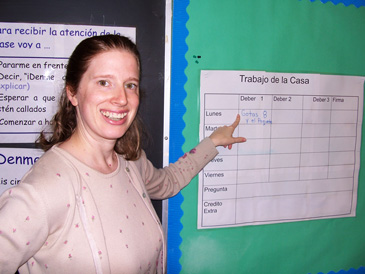
Or, access www.ClassroomManagement.com.
Sacha Luria of Portland, Oregon, writes,
“I would have to say that I am having my best year teaching,
ever! I am a part time fifth grade immersion teacher.
This summer I took the classroom management class, and it has
totally changed the way I started out the year. Two weeks
into the school year, I really don't have ANY management problems.
It is just amazing!”
Your professional life as a floating teacher will take an intense
thought process and effort to implement. But once it is
in place, you will hardly recognize the difference between being
assigned a classroom and floating and will come to enjoy
the economy of professional practice you have created.
It takes no more effort, just a different sense of organization
and management.
You’ll have plenty of time left in the day to go home and
make that delicious Floating Island dessert and have a scoop of
it as you watch your favorite magician on TV. And if, by
chance, he or she performs a levitation illusion, you can smile
to yourself with pride knowing you have the magic within
you to create an effective learning classroom for your students.
 For a printable version of this article click
here.
For a printable version of this article click
here.
Harry & Rosemary Wong products: http://www.harrywong.com/product/
Email Harry Wong: harrywong@teachers.net
Gazette Articles by Harry & Rosemary Wong:
If you spot a link that appears to be out-of-date, please alert us at webmaster@teachers.net!
- A Grateful Goodbye After 15 Years (Jun 2015)
- Love, Marriage, and Babies, Oh My! (May 2015)
- Retention Rate Is 100 Percent (Apr 2015)
- Teacher Effectiveness and Human Capital (Mar 2015)
- Training Teachers to Be Effective (Feb 2015)
- Making Deals Is Ineffective (Dec 2014 / Jan 2015)
- Retrieving and Carrying Electronic Devices (Nov 2014)
- Sharing to Succeed (Oct 2014)
- How a University Prepares Its Students (Sep 2014)
- Effective Teaching (Aug 2014)
- Your Future Is in Your Hands (June/July 2014)
- The Classroom Management Book (May 2014)
- When Students Succeed; Teachers Succeed (April 2014)
- Teaching New Teachers How to Succeed (March 2014)
- Execute and Praise (February 2014)
- Shaping a Solid Foundation (Dec 2013 / Jan 2014)
- The Most Misunderstood Word (November 2013)
- How to Start Class Every Day (October 2013)
- Prevention: The Key to Solving Discipline Problems (September 2013)
- Planning, Planning, Planning (August 2013)
- Are You THE One? (June / July 2013)
- Practical Examples That Work (May 2013)
- A Disability Is Not a Handicap (Apr 2013)
- Totally Inexcusable (Mar 2013)
- Be Proud of Public Education (Feb 2013)
- Structure Will Motivate Students (Dec 2012 / Jan2013)
- Orchestrating the Classroom (Nov 2012)
- The Lasting Impact of Instructional Coaching (Oct 2012)
- Learning, Laughing, and Leaving a Legacy (Sep 2012)
- Twenty-two, First Year, and Legit (Aug 2012)
- A Master Teacher of Teachers (June/July 2012)
- Where Going to School Means Success (May 2012)
- A Nationally Celebrated High School (Apr 2012)
- The Highest Rated School in New York City, Part 2 (Mar 2012)
- The Highest Rated School in New York City, Part 1 (Feb 2012)
- The Importance of Culture (Dec 2011 / Jan 2012)
- You Can Teach Classroom Management (Nov 2011)
- Seamless, Transparent, and Consistent (Oct 2011)
- Coaching Teachers to Be Effective Instructors (Sep 2011)
- How a Principal Creates a Culture of Consistency (Aug 2011)
- Graduation Begins in Your Classroom (June/July 2011)
- The Inspiration of a Mother (May 2011)
- How to Be an Effective Leader (Apr 2011)
- Learning Objectives: The Heart of Every Lesson (Mar 2011)
- Even Shakespeare Had Structure (Feb 2011)
- Effectiveness Defined: It's Not a Mystery (Dec 2010 / Jan 2011)
- Surviving Without a Principal (Nov 2010)
- Achieving Greatness: Locke Elementary School, Part 2 (Oct 2010)
- Teaching Greatness: Locke Elementary School, Part 1 (Sep 2010)
- Effective from the Start (Aug 2010)
- Ten Year Summary of Articles, 2000 to 2010 (June/July 2010)
- The Success of a Culture of Consistency (May 2010)
- Training Teachers to Be Effective (Apr 2010)
- Learning to Teach, Teaching to Learn (Mar 2010)
- Turning Teaching Dreams into Reality (Feb 2010)
- Dreams and Wishes Can Come True (Dec 2009 / Jan 2010)
- Success in a State Controlled School (Nov 2009)
- Inner City Is Not An Excuse (Oct 2009)
- Exceeding All Expectations (Sep 2009)
- Teachers Are the Difference (Aug 2009)
- Nine Year Summary of Articles, 2000 to 2009 (Jun/Jul 2009)
- Teachers Are the Greatest Assets (May 2009)
- The Tools for Success (Apr 2009)
- Assessing for Student Learning (Mar 2009)
- To Be an Effective Teacher Simply Copy and Paste (Feb 2009)
- The Sounds of Students Learning and Performing (Dec 2008)
- A School That Achieves Greatness (Nov 2008)
- Boaz City Schools: Professional Learning Teams (Oct 2008)
- It Was Something Close to a Miracle (Sep 2008)
- A Computer Teacher Shows the Way (Aug 2008)
- Eight Year Summary of Articles, 2000 to 2008 (Jun/Jul 2008)
- An Amazing Kindergarten Teacher (May 2008)
- Schools That Beat the Academic Odds (Apr 2008)
- Academic Coaching Produces More Effective Teachers (Mar 2008)
- Coaches Are More Effective than Mentors (Feb 2008)
- Wrapping the Year with Rap! (Dec 2007/Jan 2008)
- The Floating Teacher (Nov 2007)
- Taking the Bite Out of Assessment—Using Scoring Guides (Oct 2007)
- Ten Timely Tools for Success on the First Days of School (Sep 2007)
- First Day of School Script - in Spanish, Too! (Aug 2007)
- Seven Year Summary of Articles, 2000 to 2007 (Jun 2007)
- Effective Teachers End the Year Successfully (May 2007)
- Training Gen Y Teachers for Maximum Effectiveness (Apr 2007)
- Classroom Management Applies to All Teachers (Mar 2007)
- Students Want a Sense of Direction (Feb 2007)
- Rubrics in Two College Classes (Dec 2006/Jan 2007)
- How to Write a Rubric (Nov 2006)
- Assessing Student Progress with a Rubric (Oct 2006)
- A 92 Percent Homework Turn-in Rate (Sep 2006)
- Effective Teachers Are Proactive (Aug 2006)
- Five Year Summary of Articles (Jun 2006)
- Hitting the Bulls Eye as a Beginning Teacher (May 2006)
- They're Eager to Do the Assignments (Apr 2006)
- The Success of Special Ed Teachers (Mar 2006)
- What Teachers Have Accomplished (Feb 2006)
- Fifty Years Ago, The Legacy (Dec 2005/Jan 2006)
- The Emergency Teacher (Nov 2005)
- Classroom Management Is Not Discipline (Oct 2005)
- A Successful First Day Is No Secret (Sep 2005)
- The Most Important Factor (Aug 2005)
- Four Year Summary of Articles (Jul 2005)
- Improving Student Achievement Is Very Simple (Part 2) (Jun 2005)
- Improving Student Achievement Is Very Simple (Part 1) (May 2005)
- Never Cease to Learn (Apr 2005)
- His Classroom Is a Real Life Office (Mar 2005)
- The Power of Procedures (Feb 2005)
- The First Ten Days of School (Jan 2005)
- PowerPoint Procedures (Nov/Dec 2004)
- The Saints of Education (Oct 2004)
- How Procedures Saved a Teacher's Life (Sep 2004)
- How to Help Students with Their Assignments (Aug 2004)
- Three Year Summary of Articles (Jun/Jul 2004)
- His Students are All Certified (May 2004)
- What to Do When They Complain (Apr 2004)
- A Well-Oiled Learning Machine (Mar 2004)
- The Effective Teacher Adapts (Feb 2004)
- How to Start a Lesson Plan (Aug 2003)
- Applying for a Teaching Job in a Tight Market - Part 2 (Jun/Jul 2003)
- Applying for a Teaching Job in a Tight Market (May 2003)
- The Effective Substitute Teacher (Apr 2003)
- A First Day of School Script (Mar 2003)
- How to Retain New Teachers (Feb 2003)
- No Problem With Hurricane Lili (Dec 2002)
- A Class Size of 500 (Nov 2002)
- Effective Practices Apply to All Teachers (Oct 2002)
- Dispensing Materials in Fifteen Seconds (Sept 2002)
- How To Start School Successfully (Aug 2002)
- Teaching Procedures Is Teaching Expectations (June - July 2002)
- $50,000 to Replace Each Teacher (May 2002)
- Even Superintendents Do It (Apr 2002)
- Impossible, No Job Openings? (Mar 2002)
- A Stress Free Teacher (Feb 2002)
- A Most Effective School (Jan 2002)
- Van Gogh in Nine Hours (Dec 2001)
- The Effective Teacher Thinks (Nov 2001)
- How a Good University Can Help You (Sep 2001)
- How to Motivate Your Students (May 2001)
- How to Recognize Where You Want to Be (Apr 2001)
- What Successful New Teachers Are Taught (Mar 2001)
- A Journey of the Heart (Feb 2001)
- The Miracle of Teachers (Jan 2001)
- It's Not the Students. It's the Teacher. (Dec 2000)
- The First Five Minutes Are Critical (Nov 2000)
- How to Start a Class Effectively (Oct 2000)
- The Problem Is Not Discipline (Sep 2000)
- There Is Only One First Day of School (Aug 2000)
- Applying for Your First Job (Jul 2000)
- Your First Day (Jun 2000)
Browse through the latest posts from the Classroom Management
Chatboard...
|





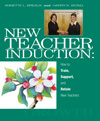



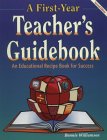
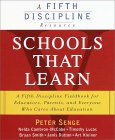

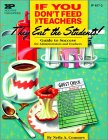
 Effective
Teaching...
Effective
Teaching... 

